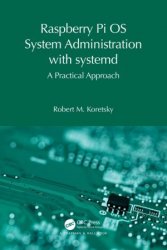Raspberry Pi OS System Administration with systemd: A Practical Approach
- Добавил: literator
- Дата: 2-10-2023, 17:14
- Комментариев: 0
 Название: Raspberry Pi OS System Administration with systemd: A Practical Approach
Название: Raspberry Pi OS System Administration with systemd: A Practical ApproachАвтор: Robert M. Koretsky
Издательство: CRC Press
Год: 2024
Страниц: 269
Язык: английский
Формат: pdf (true)
Размер: 14.3 MB
The first in a new series exploring the basics of Raspberry Pi Operating System (OS) administration, this volume is a compendium of easy-to-use and essential system administration for the novice user of the Raspberry Pi OS.
The overriding idea behind the system administration of a modern, 21st-century Linux system such as the Raspberry Pi OS is the use of systemd to ensure that the Linux kernel works efficiently and effectively to provide the three foundation stones of computer operation and management: computer system concurrency, virtualization, and secure persistence. Exercises are included throughout to reinforce the readers’ learning goals with solutions and example code provided on the accompanying GitHub site.
This book is a compendium of easy-to-use and essential Raspberry Pi OS system administration tasks for the beginner. The Raspberry Pi OS is derived from the Debian branch of Linux, and as of this writing, Debian Bullseye was the most current version of that operating system. To present the system administration topics and commands here, I have selected some very basic stuff, and a few more advanced concepts, topics, commands, and details that might not appear in a more complete system administration book.
The overriding idea behind system administration of a modern, 21st-century Linux system such as the Raspberry Pi OS, is the use of systemd to ensure that the Linux kernel works efficiently and effectively to provide these three foundation stones of computer operation and management: computer system concurrency, virtualization, and secure persistence.
And this control of the kernel by a “super-kernel,” which is what systemd essentially is, must also promote the highest level of system performance and speed, given the use cases the computer might be put to, and the perceived needs of the target user base that the computer serves. Unless a novice user, or even a more seasoned system professional, has not only a basic, but also a more complete knowledge of how systemd controls and oversees every process operation of a modern Linux system, they will never be able to master administrating and implementing the kind of functionality that their use case(s) might ultimately require. Particularly for the user base on the system, and the demands that user base makes.
Everything illustrated in Chapters 0, 1, and 2, in the specific form (and the syntax of commands) found there, is explicitly applicable to all Debian-family distributions, including the Raspberry Pi OS, and also to all other versions of Debian, including Ubuntu, and Linux Mint, RedHat-family CentOS, and Slackware distros, such as SuSE. The major areas of development of Linux over the last several years has been the expansion of the role that systemd plays in every aspect of Linux operating system use.
This book is aimed at students and practitioners looking to maximize their use of the Raspberry Pi OS. With plenty of practical examples, projects, and exercises, this volume can also be adopted in a more formal learning environment to supplement and extend the basic knowledge of a Linux operating system.
Скачать Raspberry Pi OS System Administration with systemd: A Practical Approach
Внимание
Уважаемый посетитель, Вы зашли на сайт как незарегистрированный пользователь.
Мы рекомендуем Вам зарегистрироваться либо войти на сайт под своим именем.
Уважаемый посетитель, Вы зашли на сайт как незарегистрированный пользователь.
Мы рекомендуем Вам зарегистрироваться либо войти на сайт под своим именем.
Информация
Посетители, находящиеся в группе Гости, не могут оставлять комментарии к данной публикации.
Посетители, находящиеся в группе Гости, не могут оставлять комментарии к данной публикации.
